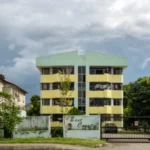Are you feeling overwhelmed by the high cost of housing in Singapore? You’re not alone. With rising prices and limited housing options, many people are struggling to find affordable homes. In this article, we’ll explore the current housing situation in Singapore and discuss some strategies for making homeownership more attainable for you.
What are the Housing Options in Singapore?
In the bustling city-state of Singapore, owning a home may seem like a daunting task for many. However, there are various options available for housing in Singapore, catering to different budgets and lifestyles. Let’s take a closer look at the housing options in Singapore, including HDB flats, private condominiums, and landed properties. Each option offers its own unique advantages and considerations, allowing individuals to make informed decisions when it comes to affording a home in this vibrant country.
1. HDB Flats
Housing Development Board (HDB) flats are a popular housing option in Singapore, offering residents affordable and high-quality living spaces.
Eligibility Check: Make sure you meet the citizenship and income requirements.
Selection Process: Select your preferred flat type and location, and apply online.
Balloting and Confirmation: After submitting your application, wait for the balloting results and confirmation of your flat selection.
Financial Planning: Arrange for the down payment, mortgage, and other financial matters.
In 1960, the Singaporean government established the HDB to address the housing shortage, resulting in the construction of numerous towns and estates throughout the country.
2. Private Condominiums
Luxury amenities, including swimming pools, gyms, and security services, are offered by private condominiums in Singapore. These properties are managed by professional management corporations, guaranteeing well-maintained facilities and common areas. Before investing in a private condominium, it is recommended to carefully review the maintenance fees and sinking fund contributions to avoid any unexpected financial burdens.
3. Landed Properties
- Singapore offers freehold landed properties with land ownership.
- These properties include bungalows, semi-detached, and terrace houses.
- Ownership of landed properties is restricted to Singapore citizens and permanent residents.
- When investing in landed properties, it is important to consider factors such as land size, location, and property condition.
To make the best decision based on your budget, preferences, and long-term plans, it is advisable to consult with a real estate agent for personalized advice on investing in landed properties in Singapore.
What are the Factors Affecting Housing Prices in Singapore?
The high cost of housing in Singapore is a commonly discussed topic, with many wondering how people are able to afford their homes in this small but bustling country. In this section, we will explore the various factors that contribute to the steep housing prices in Singapore. From the location of the property to the type of property and even government policies, we will delve into the complexities of the Singapore housing market and how it affects the affordability of homes for its residents.
1. Location
- Evaluate the location’s proximity to essential amenities such as public transport, schools, and healthcare facilities.
- Consider the safety, cleanliness, and overall ambiance of the neighborhood.
- Assess the potential for future development and infrastructure projects in the area.
When considering the location for your housing in Singapore, it’s important to thoroughly research the neighborhood, amenities, and future prospects to make an informed decision that aligns with your lifestyle and long-term goals.
2. Property Type
- HDB Flats: A type of government-subsidized housing for Singaporean citizens, providing affordable and secure living options.
- Private Condominiums: Exclusive residential properties with luxurious facilities and services, often owned by private developers.
- Landed Properties: Independent houses with a private land area, offering more space and privacy but at a higher cost.
3. Government Policies
- Evaluate government policies on housing, including subsidies, grants, and regulations.
- Consider the impact of these policies on housing demand, supply, and pricing.
- Stay updated on new policies and amendments to make informed decisions regarding housing.
Understanding the implications of government policies is crucial in navigating the housing market.
How Do People Afford Houses in Singapore?
As one of the most expensive cities in the world, many wonder how people in Singapore can afford to own a house. In this section, we will explore the various ways in which individuals and families can afford houses in Singapore. From government housing schemes to personal savings and investments, and even taking out loans and mortgages, we will uncover the different strategies that people use to secure a home in this bustling city-state.
1. Government Housing Schemes
- Understand Eligibility: Check if you meet the criteria for HDB’s Government Housing Schemes based on citizenship, income, and family nucleus.
- Choose the Right Scheme: Explore options like the Built-to-Order (BTO) or Sale of Balance Flats (SBF) to find suitable housing under the Government Housing Schemes.
- Financial Planning: Prepare for costs by leveraging Central Provident Fund (CPF) savings and housing grants provided by the Government Housing Schemes.
- Application Process: Follow the application timeline and procedures diligently to secure a home through the Government Housing Schemes.
Pro-tip: Research and understand the various Government Housing Schemes to make an informed decision about your housing options and financial commitments.
2. Savings and Investments
- Assess Financial Position: Evaluate current savings and investments, as well as future earning potential.
- Set Financial Goals: Determine the necessary amount for a housing investment and create a savings plan accordingly.
- Explore Investment Options: Consider various vehicles such as stocks, bonds, and mutual funds to grow savings.
- Manage Risk: Diversify investment portfolio to mitigate potential losses.
- Seek Professional Advice: Consult financial advisors to make informed decisions about investments that align with housing goals.
3. Loans and Mortgages
- Assess Financial Readiness: Evaluate income stability, credit score, and debt-to-income ratio.
- Research Lenders: Compare interest rates, loan terms, and eligibility criteria for loans and mortgages.
- Prepare Documentation: Gather proof of income, employment history, and financial statements for loans and mortgages.
- Apply for Pre-approval: Get an estimate of the loan amount and interest rate for loans and mortgages.
- Negotiate Terms: Discuss repayment options, interest rates, and loan tenure for loans and mortgages.
Consider consulting a financial advisor for personalized guidance on navigating the complex landscape of loans and mortgages.
What Are the Challenges of Affording a House in Singapore?
As one of the most expensive cities in the world, it can be a daunting task for individuals to afford a house in Singapore. In this section, we will discuss the various challenges that people face when trying to purchase a home in this bustling city-state. These challenges include the high cost of living, limited land supply, and intense competition and bidding wars. By understanding these obstacles, we can gain insight into the complex and competitive housing market in Singapore.
1. High Cost of Living
Considering the high cost of living in Singapore, it’s crucial to carefully assess housing options, prioritize financial planning, and explore available subsidies to effectively manage housing expenses.
- Evaluate Housing Options: Compare HDB flats, private condominiums, and landed properties to find the most cost-effective choice amidst the high cost of living in Singapore.
- Financial Planning: Create a budget that prioritizes housing expenses while balancing other essential costs in the high-cost environment.
- Explore Subsidies: Investigate government housing schemes and financial aid options to alleviate the burden of housing expenses.
2. Limited Land Supply
In Singapore, the availability and prices of housing are greatly affected by the limited land supply. Due to the small land area, the government utilizes strategies such as land reclamation and maximizing land use. This scarcity creates a high demand for housing, resulting in competitive bidding and elevated prices.
To address this challenge, government policies strive to optimize land use by balancing residential, commercial, and green spaces.
3. Competition and Bidding Wars
- Stay informed about the current housing market trends and prices.
- Get pre-approved for a mortgage to show sellers you’re a serious buyer.
- Work with a real estate agent who has experience in competitive markets, including navigating through competition and bidding wars.
- Be ready to act quickly and decisively when a suitable property becomes available.
- Consider properties that have been on the market for a while or are undervalued, as they may not be subject to intense competition and bidding wars.
During the 1990s property boom in Singapore, competition and bidding wars for limited housing units were intense, leading to skyrocketing prices and making it challenging for many to afford a home.









